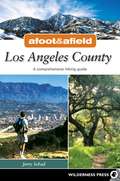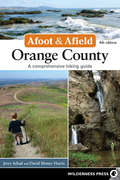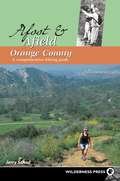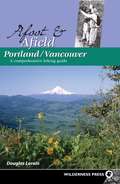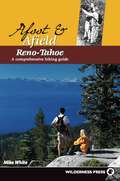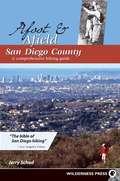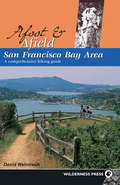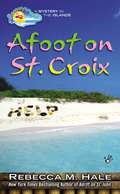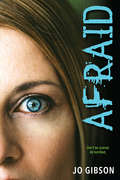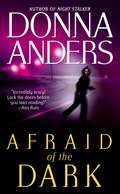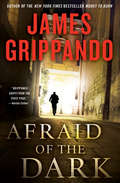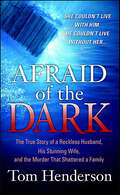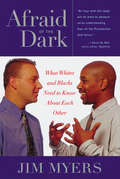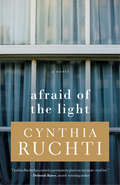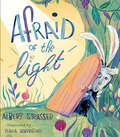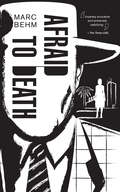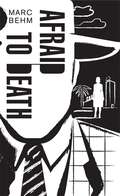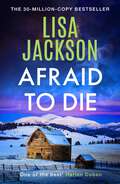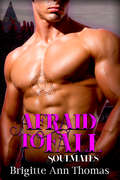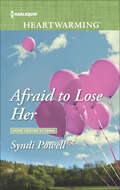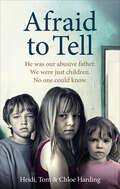- Table View
- List View
Afoot and Afield: Los Angeles County
by Jerry SchadJerry Schad is your knowledgeable and reliable guide for the 192 trips in this book--ranging from gentle family walks in Griffith Park to strenuous treks over the spine of the San Gabriel Mountains. Whether you see solace from the crowds, a cardiovascular workout, or a new perspective of the natural world around you, this book provides all you need to know.The second edition of this popular book covers all of the county's open spaces. A total of 192 hikes-including 17 new ones-are described in detail with trips organized into specific areas. Illustrated; detailed maps.
Afoot and Afield: Orange County
by Jerry Schad David Money HarrisThis completely updated and expanded new edition in the Afoot and Afield series is the classic guide to the hiking opportunities throughout Southern California's Orange County. Featuring more than 100 trips from serene summits to sparkling beaches, Afoot and Afield Orange County covers the Laguna Coast, Newport Beach, Crystal Cove State Park, the Chino Hills, Santa Rosa Plateau Ecological Reserve, the Santa Ana Mountains, and more. Trips ranging from short strolls to rigorous daylong treks are all within a short car trip of the Southland's cities. Every trip was re-hiked by coauthor David Money Harris for this updated edition.
Afoot and Afield: Orange County
by Jerry SchadThis completely updated and expanded new edition in the Afoot & Afield series is the ultimate guide to the hiking opportunities throughout Southern California's Orange County. Featuring 87 trips from serene summits to sparkling beaches, Afoot & Afield Orange County covers the Laguna Coast, Newport Beach, Crystal Cove State Park, the Chino Hills, Santa Rosa Plateau Ecological Reserve, the Santa Ana Mountains, and more. Trips ranging from short strolls to rigorous daylong treks are all within a short car trip of the Southland's cities.
Afoot and Afield: Portland/Vancouver
by Douglas LorainIn nearly 200 trips Afoot & Afield Portland/Vancouver covers every hike within a one-hour drive of this metropolitan area. Hit the trail through dense old-growth forests, walk beside waterfalls, climb to viewpoints above massive glaciers, or wander through the quiet forests of a 5000-acre park in metro Portland itself. The hikes range from simple strolls through urban preserves to rugged climbs in the Columbia River Gorge and on glacier-clad Mt. Hood. Hikes that are great in cloudy weather are labeled, and each hike is shown on an up-to-date map. Each hike includes at-a-glance essential information - distance, time, elevation change, and difficulty rating.
Afoot and Afield: Reno-Tahoe
by Mike WhiteThis title in Wilderness Press's successful Afoot & Afield series is the most comprehensive outdoor guide to the vast backcountry surrounding Reno and Lake Tahoe. This guide features more than 150 trips in the Reno and Lake Tahoe region, including Graeagle, Truckee, Echo Summit, Mt. Rose, and Carson Valley. Trips range from easy strolls to challenging treks and include distance, time, elevation gain, difficulty, and trail notes.
Afoot and Afield: San Diego County
by Jerry SchadThe Los Angeles Times has hailed Southern California' hiking guru Jerry Schad's Afoot & Afield San Diego County as "the bible of San Diego hiking." Encompassing the county from Sunset Cliff Park and the Bayside Trail at Point Loma to Fonts Point in the Borrego Badlands, this hiking guide is the "must-have" to explore San Diego's diverse outdoors. The book covers all the worthwhile hiking destinations throughout the county - including the coast, foothills, mountains, and desert - in trips ranging from the short family excursions to multi-day backpacks. This long-awaited fourth edition of San Diego County's most recognized and comprehensive hiking guide has been fully updated and expanded to cover 250 hikes. All new maps.
Afoot and Afield: San Francisco Bay Area
by David WeintraubThis title in the acclaimed Afoot & Afield series contains more than 100 carefully described trips in the nine-county region. Included are all the well-known favorites: Mt. Tamalpais, Point Reyes National Seashore, Henry W. Coe and Mt. Diablo state parks, and Rancho San Antonio Open Space Preserve. The book also features more remote parks and preserves, from the rugged Sonoma coast to hidden canyons south of San Jose, as well as regional open spaces and country parks from the East Bay hills to the Santa Cruz Mountains.
Afoot on St. Croix
by Rebecca M. HaleFrom the New York Times Bestselling Author of Adrift on St. John and the Cats and Curios Mysteries comes a chilling new tale of mayhem in the Virgin Islands... For tourists, the idyllic island of St. Croix is a perfect escape from the world. For Charlie Baker, it's a trap. He hasn't set foot on the island since his life fell apart there ten years ago. But now his ex-wife is luring him back with the promise of a family reunion--a promise she keeps breaking. He always knew Mira was a little crazy, but returning one last time--determined to see his children no matter what--he's about to discover just how crazy she is. And with a mysterious figure lurking in the shadows who could be the source of the terrifying Goat Foot Woman legend, he will also learn what dark fate the island has in store for him.
Afraid
by Jo GibsonFrom master of suspense Jo Gibson comes two chilling novels of irrational fear--two living nightmares with no hope, no mercy, and no end in sight. . .Dance Of DeathThey were the most gorgeous shoes Donna Burke had ever seen. An exquisite pair of scarlet high heels. And allegedly cursed. According to the old shopkeeper, the shoes endowed their wearers with incredible talent--and horrible misfortune. But that doesn't stop Donna's friends from buying them. One by one, the girls are drawn to the shoes. One by one, the girls suffer grisly fates. And learn a sinister, final truth: One size kills all. The Dead GirlJulie Forrester is a dead ringer for her cousin Vicki. They could pass for twins--except for the fact that Vicki isn't alive anymore. Now, when Julie goes to stay with her aunt and uncle in Colorado, everyone keeps mistaking her for her cousin. Late at night, she even dreams about Vicki. Reaching out from the grave. Trying to come back. With each passing day, Julie fears she's becoming someone else. Someone sick. Someone deranged. Someone dead.
Afraid of the Dark
by Donna AndersAs a single mother struggling to get by in a tough neighborhood, policewoman Jessie Cline knows she can't protect her son from the streets forever. For his sake, she takes a job as assistant police chief in a small island town off the coast of Washington state where she lived as a child. But her search for a safe haven will lead her toward more danger than she ever imagined. Even as Jessie tries to start anew, the secrets of her family's painful past -- and her own troubled life -- return to haunt her and threaten her son. Someone on the island knows Jessie very well, and will do anything to drive her away. They will stalk her. They will frighten her. And if she cannot unravel a sinister disappearance that connects her past to the present, they will kill her...
Afraid of the Dark (Jack Swyteck #9)
by James Grippando<P>The New York Times bestselling author's ever-popular hero, Jack Swyteck, is on his most dangerous case yet, uncovering a sinister underground world that has him racing across the globe. <P>Then: Sergeant Vince Paulo held his best friend's daughter, McKenna, bleeding in his arms as she uttered the name of her murderer and ex-boyfriend, Jamal. That was minutes before a blast made everything go black for Vince--forever. <P>Now: Miami criminal defense lawyer Jack Swyteck has been called in to save Jamal from the death penalty for terrorist activity. Despite urgent warnings from his fiancée, undercover FBI agent Andie Henning, to stay away from the case, Jack finds himself inextricably drawn to Jamal's past--even believing his alibi that he was abducted and held in a black site in Prague at the time of McKenna's death. But if Jamal is innocent, then the man who murdered McKenna and took Vince's sight is still out there . . . free. <P>Soon bodies begin to pile up and ghosts from the past reappear very much alive, confirmed by ominous threats from a faceless man known only as "the Dark." Vince and Jack must confront a mortal danger that goes beyond McKenna's death, across international waters--a journey to piece together the past that leads through the back alleys of London, onto illegal Internet sites, and straight into the mind of pure evil.
Afraid of the Dark: The True Story of a Reckless Husband, His Stunning Wife, and the Murder That Shattered a Family
by Tom HendersonDetroit mortgage broker Mark Unger adored his wife Florence and their two young sons. But after a decade of marriage and increasing financial trouble, Mark's life began to slowly unravel. He became addicted to pain killers and gambling, and ended up spending five months in rehab.Forced to go back to work, Flo became bitter and resentful of Mark and began to have an affair with one of his friends. When Mark returned home and his disability checks weren't enough to make ends meet Flo filed for divorce. Panicked by the thought losing her, Mark did everything he could to win Flo back. Even though she resisted his efforts, Flo did agree to a weekend getaway at the family's favorite lakeside resort. But after their first night there, Flo went missing…and the next day her corpse was found floating in the water. Mark claimed that her death was an accident—one that must have happened while he was up at the cottage, putting the kids to sleep. But soon a jury would be convinced of what Flo's friends and family believed to be true: That Flo would never have been alone on the boat dock that night because she was deathly AFRAID OF THE DARK.
Afraid of the Dark: What Whites and Blacks Need to Know about Each Other
by Jesse Jackson Jim MyersThe definitive guide for anyone who has contact with people of another race--in companies, schools, neighborhoods, or other social situations--this book asserts that race is not the unfathomable mystery it is usually made out to be. In a revealing, accessible, and stimulating discussion based on little-known facts and innovative research, this book explains why many whites are uneasy about blacks and how blacks react to this, why numerous blacks suspect the worst from whites, why white explanations don't hold up, why myths about sex remain so prevalent, and what both races can do together to make their relations better.
Afraid of the Light
by Cynthia RuchtiShe helps others manage their desperate lives--but who will help her?Clinical psychologist Camille Brooks isn't put off by the lifestyle of her hoarding clients. After all, she lost her mother to the crippling anxiety disorder. She'll go a long way to help others avoid the same pain and loss.Despite Camille's expertise, her growing audience for her Let in the Light podcast, and the national recognition she's gaining for her creative coaching methods, there are some things she isn't prepared for. A client who looks far too much like her mom catches her off guard. And the revelation that she's also hoarding something sends her spinning.Can she stand to let the light into her own life with the help of a friend who wants to stand by her for life and the God who created and loves her? Or will she find that defeating her demons proves too much to bear?
Afraid of the Light: A Story about Facing Your Fears
by Albert StrasserA delightfully fun and rhythmic story about overcoming our fears and learning to try something new.Ditter Von Dapp is a quirky rabbit who is painfully afraid of the light. Having confined himself to a cozily dark cave to avoid his biggest fear, he is one day forced to light a candle in order to find a lost left shoe. Despite being afraid that the light "might drive me crazy or turn me to goo," Von Dapp slowly discovers just how wonderful light can be. In his newly illuminated world, he finds that a wise mouse had stolen his shoe to teach him a valuable lesson. With playful rhymes and incredibly rich illustrations, children and parents will delight in reading Ditter Von Dapp's journey. His realization that the light isn't something to be afraid of will help children learn to face their own fears--they just might open themselves up to a new world they never would have imagined and find a new friend in the process!
Afraid to Death
by Marc Behm"Insanely evocative and extremely satisfying." — The Times (UK)Joe Egan has spent his life on the run. When he was a child, he thought he saw the angel of death. Now every time someone close to him dies, a mysterious blonde woman appears and he's forced to retreat, abandoning jobs and relationships in a never-ending flight across a hallucinatory version of the United States. Is the woman real, a figment of his imagination, or a supernatural apparition — perhaps even the devil incarnate?The Guardian praised Marc Behm as "a terrific novelist," adding that "Afraid to Death is a fascinating mirror image to The Eye of the Beholder." Behn's previous novel, also available from Dover Publications, spins a gripping tale of obsession and suspense in which a private investigator trails an enigmatic young woman. But this time the protagonist, a dissolute gambler, is being chased by a female character whose reoccurrences excite both fear and attraction.
Afraid to Death
by Marc BehmConsidered a modern classic in France, Afraid to Death is a chilling psychological thriller with a hallucinogenic quality. Joe Egan is on the run. A mysterious blonde appears to him whenever someone close to him dies. He lives his life in fear of her, but at the same time develops a strange fascination with her. Who is the blonde woman? Is she a figment of his imagination, the angel of death, or even the devil incarnate?
Afraid to Death
by Marc BehmConsidered a modern classic in France, Afraid to Death is a chilling psychological thriller with a hallucinogenic quality. Joe Egan is on the run. A mysterious blonde appears to him whenever someone close to him dies. He lives his life in fear of her, but at the same time develops a strange fascination with her. Who is the blonde woman? Is she a figment of his imagination, the angel of death, or even the devil incarnate?
Afraid to Die: A thriller with a strong female lead and shocking twists (Montana Mysteries #4)
by Lisa Jackson'Shiveringly good suspense!' Lisa GardnerTHE FOURTH BOOK IN A GRIPPING SERIES FROM 30 MILLION COPY SELLING AUTHOR.Others may dread the bone-numbing cold of winter, but the killer relishes it. The way the frigid water preserves his victims, the feel of their icy skin beneath his fingers. Before long, the world will see their beauty - and his vengeance.The Bitterroot Mountains are in the grip of a hard winter when the detectives first see the two bodies: each frozen solid, yet deliberately displayed. Both victims are women known to Detective Selena Alvarez. Each of them is wearing a piece of her jewellery. Selena's partner Regan Pescoli and the entire department are working on this case, and so is P.I. Dylan O'Keefe, a man Selena got too close to once before. But this killer already knows too much about the mistakes Selena has tried to outrun. The secrets of her past are coming to the surface, one by one. And soon a madman bent on revenge will show her just how much she has to lose . . .'She is one of the best' Harlan CobenTHE NEXT BOOK IN THE SERIES, READY TO DIE, IS AVAILABLE NOW
Afraid to Die: He Knows Her Worst Fears And He's Making Them Come True (An Alvarez & Pescoli Novel #4)
by Lisa JacksonA Montana serial killer is out to taunt and terrorize Detective Selena Alvarez in this psychological thriller by the #1 New York Times bestselling author. The town of Grizzly Falls, Montana, is still on edge in the wake of a serial killer&’s capture. Thanks to Detectives Selena Alvarez and Regan Pescoli, the nightmare is over. But a new one is about to unfold. There are two victims so far—their bodies found frozen solid and deliberately displayed. Both are women Selena knew. And each wears a piece of her jewelry. Selena, Regan, and the entire department are on the case, as is P.I. Dylan O'Keefe—a man Selena got too close to once before. But this killer already knows too much about Selena's secret terror, her flaws, and the past she's tried to outrun. And soon he'll show her that she has every reason to be afraid. Selena's partner, Detective Regan Pescoli, and the entire department are on the case, as is P.I. Dylan O'Keefe--a man Selena got too close to once before. But this killer already knows too much about Selena's secret terror, her flaws, and the past she's tried to outrun. And soon he'll show her that she has every reason to be afraid. . .
Afraid to Fall (Soulmates #1)
by Brigitte Ann ThomasA thousand years he's waited to have her back in his life—his one true love, his soul mate. He felt it the second she came back into the world. He had to protect her, even if it meant staying away.On the night of her twenty-first birthday, Eadric Bishop is forced to intervene when a group of Soulless demons snatch her from the dance floor. When the attacks continue, it becomes clear that something bigger is going on. There's a plot to take out both him and the one he loves, but Eadric would do anything to save his soulmate. Anabell Todd was a normal, introverted college student when Eadric waltzed into her life and literally swept her off her feet. She tries to run, but something deep within her connects with Eadric more than she cares to admit. Eadric is her only salvation—and she is his. Bigger things are after them than they know. When their bond is put to the test, who ends up saving who?
Afraid to Lose Her: Hope Center Stories (Hope Center Stories #1)
by Syndi PowellWhen a border patrol agent faces a devastating diagnosis, her partner will prove his loyalty—and devotion—in this heartwarming medical romance.Border patrol agent Desmond Jackson would gladly take a bullet for his partner. Instead, it’s Detroit border patrol agent Sherri Lopez who ends up wounded in a drug raid—then blindsided by a shocking diagnosis. The woman Dez secretly loves has always been a warrior. Now she’s in a fight for her life.Strong and independent, Sherri can’t allow herself to lean on anyone—even Dez. But how can she not realize how good they are together? All Dez knows is he can’t lose her . . . or the friendship that’s slowly evolving into something even more precious.
Afraid to Ride
by C. W. AndersonJudy was looking forward to riding camp, but it wasn't what she had dreamed of. The horses are bad tempered, the riders don't have control, and Judy becomes terrified that someday she may fall off and be trampled. One day she is assigned Duke, a disasterous horse, and is badly injured when Duke falls. When she recovers from the accident, Judy is terrified to get back in the saddle. Mr. Jeffers her former riding instructor has an inspiration: perhaps Judy could regain her love of horses if she has a horse who needs to regain her trust in human beings. With a wrecked mare, Fair Lady, Judy learns to love horses again, and finds that she has a truly spectacular horse.
Afraid to Tell
by Heidi Harding Tom Harding Chloe HardingHe was our abusive father.We were just children.No one could know.Heidi was 18 when she read her little sister Chloe’s diary, and discovered that they shared a terrible secret: they had both been abused by their father. After years of fear and isolation, Heidi knew she had to go to the police. For a long time, Chloe resented Heidi for forcing her to disclose what had happened when she wasn’t ready, while their brother, Tom, couldn’t understand how he had so misjudged his father, and at first he didn’t believe their tale. The truth threatened to destroy them all. This is the very honest story of three siblings, and how a man they trusted threatened to tear their family apart.
Afraid: Be careful who you trust
by Mandasue Heller'One of the bad girls of gritty crime' Daily Mirror When fifteen-year-old Skye's mother finally does something so shocking that it can't be hushed up, the police turn Skye over to the social workers - and that's when the nightmare begins. No one will let her talk to her father. And the woman who is supposed to be helping her dumps her in a terrifying 'home' that's more like a jail. But she still has one friend to turn to: the sympathetic girl she's met in an internet chat room, the one who seems to have a home life as unhappy as Skye's. So when Jade offers Skye - now alone in Manchester and nearly penniless - a safe place to stay, Skye is willing to trust her. Even when it isn't Jade who turns up at the rendezvous, but a grown-up man who says he's Jade's brother . . .'Mandasue has played a real blinder with this fantastic novel' Martina Cole on Forget-Me-Not 'A cracking read that will chill you to the bone' Sun on Two-Faced
